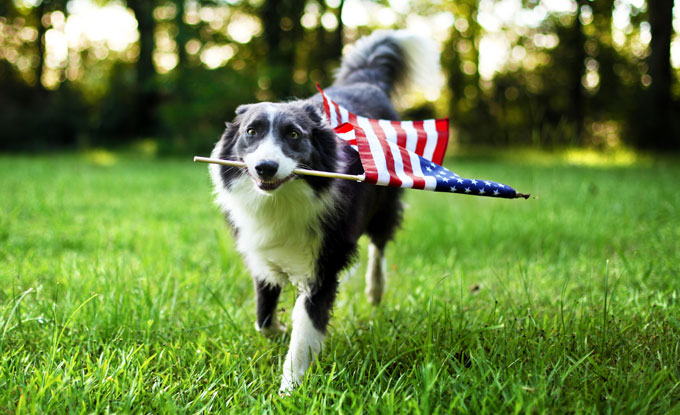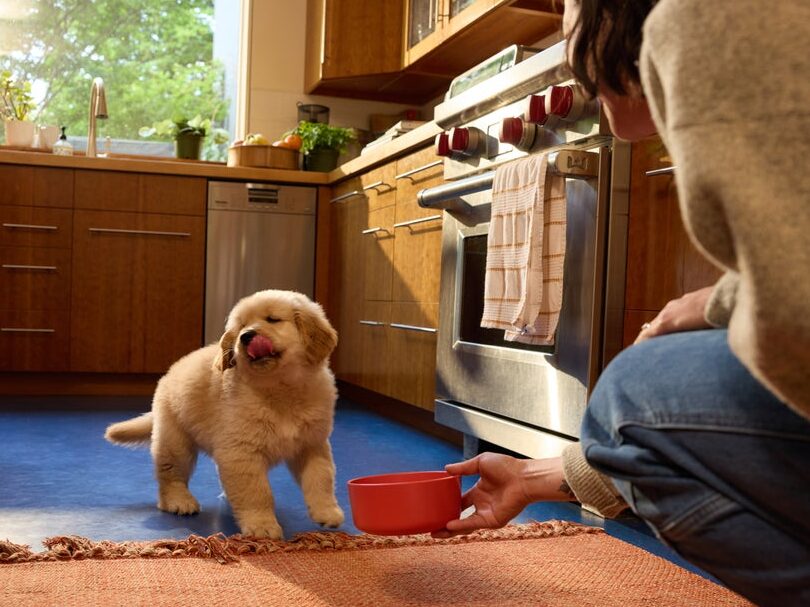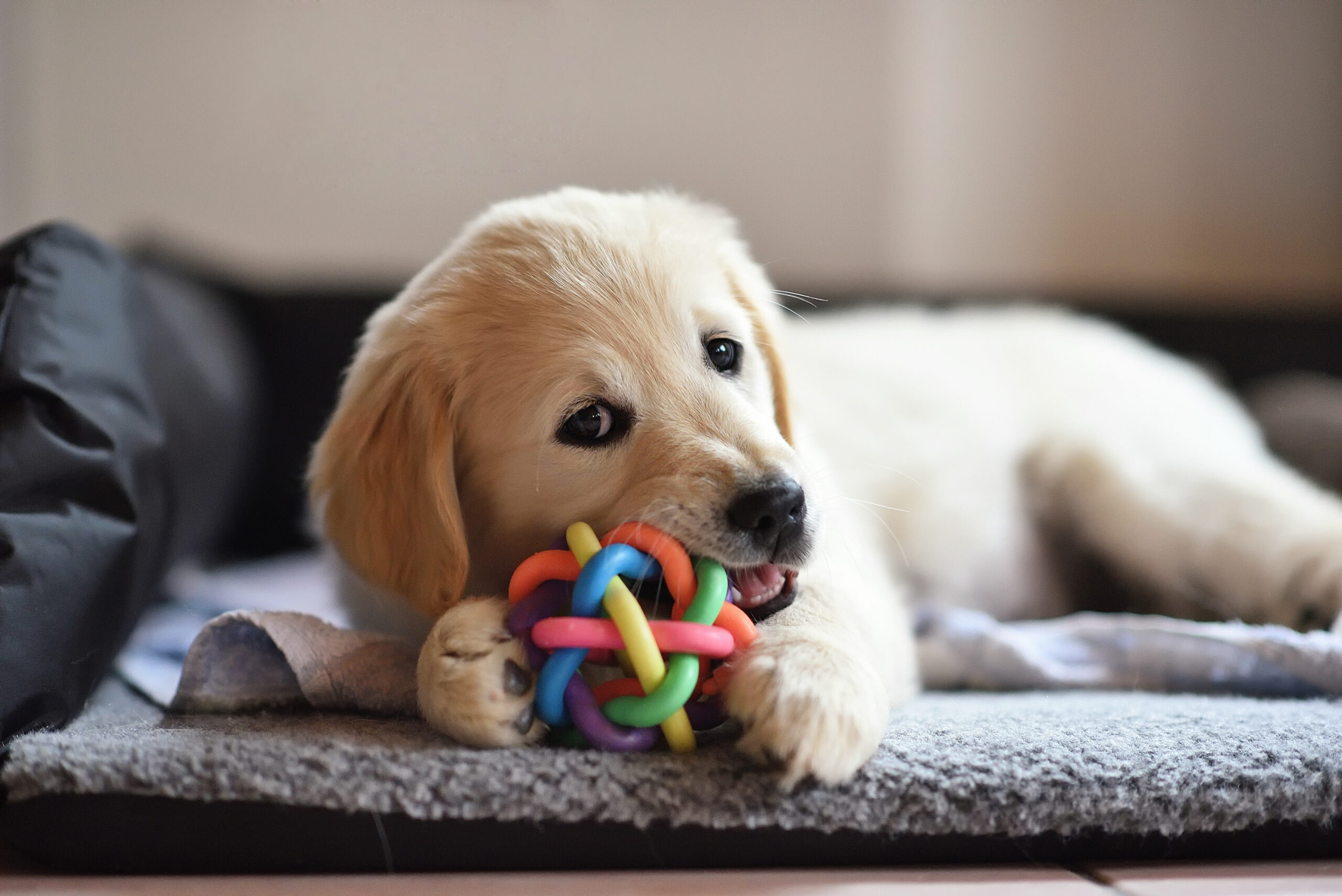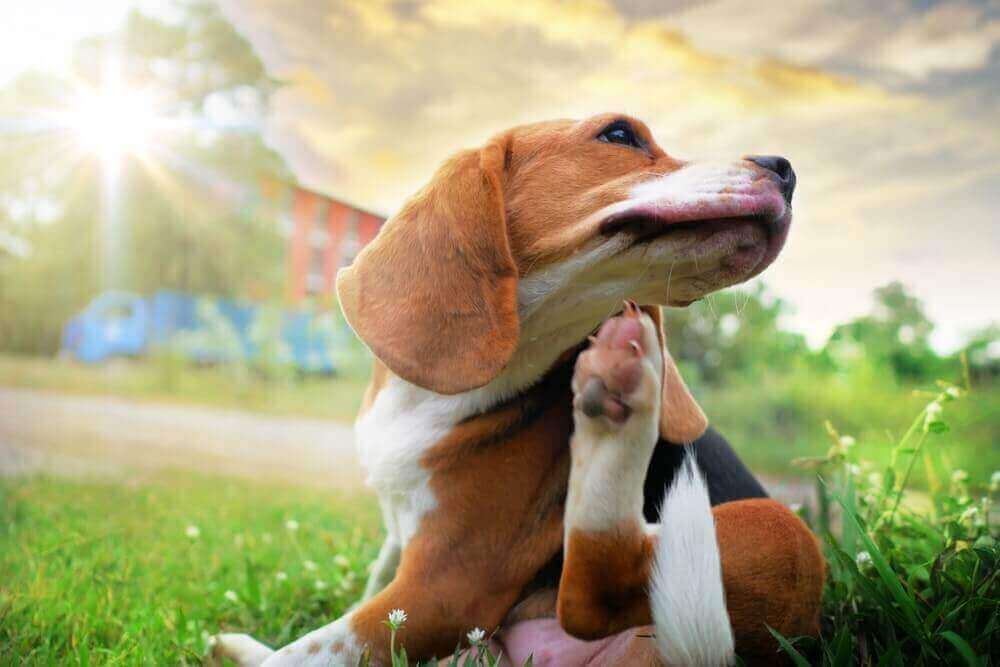Hey Ollie blog readers! We’re offering you an exclusive 60% OFF your starter box! Try now!
Every summer, fireworks-related anxiety sends countless dogs into a tailspin of terror. The loud, sudden, and unrecognizable noises activate the canine sympathetic nervous system (i.e., your dog’s fight, flight, or freeze response) and prompt panicked, sometimes dangerous or life-threatening, actions. If a dog’s anxious response is left unaddressed, an affected dog may generalize their fear and become sensitive to other sounds, such as thunder, heavy equipment, or everyday items, such as appliances. If pyrotechnics ignite your pup’s chain reaction of stress and worry, make a plan to extinguish their fireworks-related anxiety for good.
Recognizing Fireworks Anxiety Signs in Dogs
Although anxiety-related behavior changes in response to fireworks are undeniable in some dogs, others may show only mild or subtle stress signs, and you can easily underestimate or completely overlook their fear. Unfortunately, if you fail to recognize and address your dog’s fireworks anxiety, their condition can worsen over time, until the affected pup experiences an emotional and physical reaction similar to a panic attack a human might suffer. Fireworks anxiety does not go away on its own and can result in self-harming behaviors, so talk to your veterinarian about your pup’s noise-induced stress.
Fireworks anxiety can cause behavior changes. Your dog’s fireworks anxiety behavior signs may include:
- Pacing or restlessness
- Hiding
- Low or crouched body posture
- Clingy or attention-seeking behavior
- Hypervigilance or extreme alertness
- Destructive behavior (e.g., digging, scratching, chewing)
- Attempted escape
Fireworks anxiety can cause physical signs. However, because physical signs can indicate underlying health issues, you should always view your dog’s behavior in the context of their surroundings. For example, consider whether your pup’s drooling preceded a distant firework’s boom. Physical signs of fireworks anxiety may include:
- Shaking or trembling
- Excessive drooling or panting
- House soiling
- Appetite loss
- Digestive upset (e.g., vomiting and diarrhea)
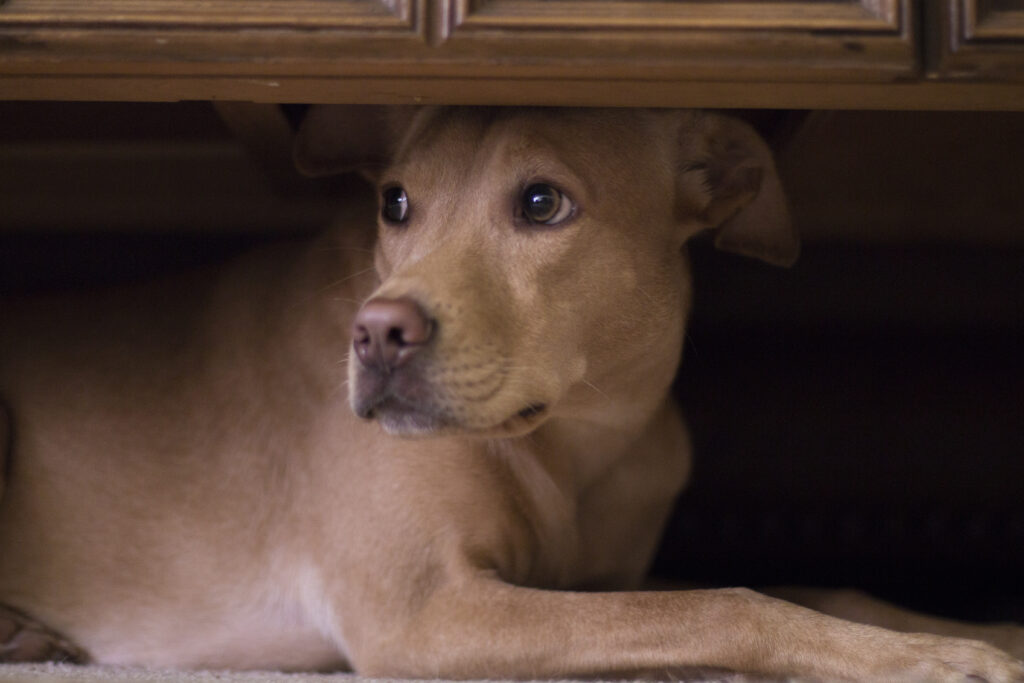
How to Prepare Your Dog For Fireworks
While you can’t take away your neighbor’s firecrackers or tell the local parks department to cancel their annual show, you can reduce your dog’s exposure to frightening fireworks and help them cope with the sudden booms. Before an upcoming fireworks show, work with your dog on anxiety-reducing strategies. By doing so, you can determine whether your pup is comfortable with each piece of the plan, and help ensure that an unexpected routine change will not alarm them.
In addition, by helping your dog learn to gradually cope with their anxiety well in advance of any fireworks, you minimize the risk of being caught off-guard if your neighbors start celebrating early. In the weeks leading up to an anticipated firework event, incorporate these strategies.
Keep Your Dog Indoors During Fireworks
No matter how well-socialized or well-adjusted your pup, they should never be outdoors during a fireworks display. Dogs have extremely sensitive hearing, and the sudden pops and booms may startle your pooch, causing them to slip their collar or jump a fence and run away.
Plan to tire out your dog by exercising them during the midafternoon, so they’re ready to rest when darkness falls and the fireworks begin. In addition, before the fireworks begin booming, ensure all your doors, windows, and gates are securely closed to prevent your terrified pooch from escaping in a panic.
Create a Safe Space For Your Dog
Frightened dogs naturally try to flee from a perceived threat, so give your panicked pup a safe place to hide by creating a cozy quiet interior space where they can rest during fireworks and other upsetting noise events. Make the space as inviting as possible by providing must-have items such as a bed, water, and familiar toys. Draw the curtains or blinds to block potentially upsetting light flashes. Additional strategies that help make your pup’s space feel safe and cozy include:
- Gentle reassurance — Simply being with your dog in their designated safe space can help them feel secure and calm. Despite common misconceptions, reassuring your dog with praise or petting when they are fearful will not worsen their anxiety.
- Aromatherapy — According to Dogs Naturally Magazine, pet-safe scents, such as lavender, neroli, and melissa, can ease dogs’ sound anxiety. Alternatively, canine pheromone products, such as Adaptil, simulate natural chemical messages through which dogs communicate and can promote a sense of security and calmness.
- Massage and acupressure — Manual therapies can ease muscle tension, lower blood pressure, and stimulate feel-good endorphin release for nervous dogs. Search online to learn simple-to-use techniques.
Reduce Your Dog’s Noise Exposure By Following Simple Soundproofing Techniques
Muffle upsetting outdoor sounds by playing white or brown noise, or classical music in your pup’s safe space. According to a Journal of Veterinary Behavior study, classical music can reduce dogs’ stress and nervousness. Look for curated playlists on your favorite streaming services, and get ready to tune into relaxation and tune out fireworks anxiety.
Take Extra Precautions When You And Your Dog Venture Outdoors
If you must be outdoors with your dog before, during, or after a fireworks event, stay in a fenced area or yard, ensure your dog’s collar is snug, and keep your pooch on a nonretractable leash. For the greatest peace of mind, ensure your dog is microchipped and that you have registered their chip number with the microchip manufacturer’s database. If you and your dog are separated, microchipping increases the chances that you and your pooch can be reunited.
Pay attention to your dog’s behavior and body language at all times and be prepared to return indoors if they appear nervous or overwhelmed. In addition, keep a close eye on your dog to ensure they don’t ingest fireworks debris.
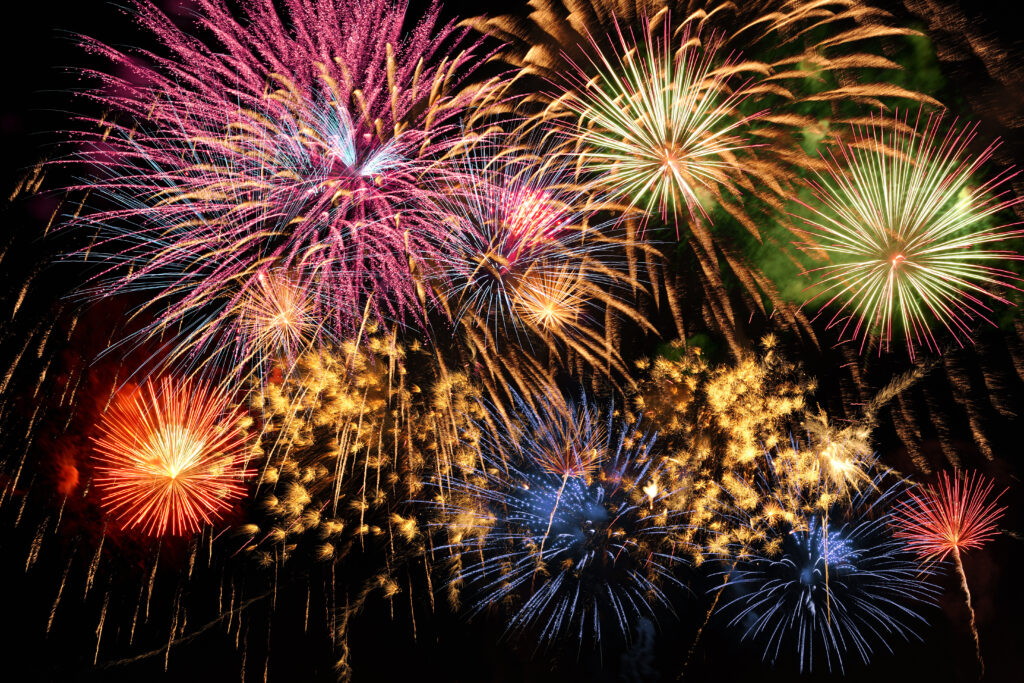
Develop a Training Plan for Your Dog’s Long-Term Relief From Anxiety
Although anxiety-reducing strategies can be helpful in the short term and protect your dog from injury, these methods do not address their underlying fear. Because fireworks anxiety will never improve and only worsen with time, systematic training is often necessary to help an affected dog learn new responses to previously troubling sounds. Noise aversion training is a gradual process that requires dedication and patience. Training steps include:
- Desensitization — Gradually exposing your dog to increasingly louder trigger sounds (e.g., fireworks sound clips)
- Counterconditioning — Creating a positive conditioned emotional response (i.e., reflexive emotion) by pairing food or other rewards with the trigger sound
If your dog’s fireworks anxiety is severe, your veterinarian may refer you to a board-certified veterinary behaviorist or a dog trainer. These professionals specialize in behavior modification to provide your pooch with personalized training and guidance.
Additional Methods for Diffusing Your Dog’s Fireworks-Related Anxiety
Noise-related anxiety affects approximately one-third of U.S. pets. However, don’t let this statistic dishearten you. Noise anxiety’s prevalence means that an ever-increasing number of products and techniques geared toward helping your pup find relief are always being introduced. Some of our favorite anxiety-reducing options for dogs include:
- Positive distractions — Enrichment activities, such as treat-dispensing balls, food puzzles, snuffle mats, and interactive toys, can give your dog something to focus on other than their fear. In addition, licking and eating are naturally soothing activities that help dogs feel satisfied and relaxed. To provide your pooch with long-lasting enjoyment, give them a hollow rubber toy or lickable mat filled and frozen with their favorite foods, including Ollie meals!
- Games and activities — Your pup already has strong positive responses to their favorite games and activities (e.g., fetch, trick training), so transfer this emotional value to unpleasant situations by playing during noisy events.
- Anxiety-reducing products — Some products aim to ease your dog’s fear by targeting their overactive nervous system. Help soothe your pet’s anxiety by offering them the following:
- Anxiety wraps — These garments create steady even pressure across your dog’s body, helping them feel comforted and secure.
- Herbal remedies — Calming herbs, such as St. John’s wort, valerian, and chamomile, can ease your dog’s stress. Talk to your pup’s veterinarian before starting your dog on herbal supplements.
- Calming supplements — Ready-to-use supplements, such as Ollie Chill Pills, combine precise amounts of powerful calming herbs in one tasty chew.
Your dog may not understand the hoopla behind noisy fireworks, but they can appreciate your attempts to keep them safe and calm. As you work through your dog’s fireworks anxiety, remember to be patient and understanding. Acknowledge your pooch’s progress, no matter how small, and allow their wins to become large victories. By respecting your dog’s emotions and encouraging their confidence, you’ll enjoy a deeper pet-owner bond. With time, your dog’s only response to “the rocket’s red glare” will be their tail wagging in air.
Resources:
Tagged As:

The nutrition your dog needs,
the food they want.

Enjoying our articles? Subscribe our Newsletters and get new articles directly to your inbox
You might also like
13 May 2025
8 MINS READ
Puppy Training Guide & Behavior Timeline
Bringing home a puppy is pure magic. It’s also pure chaos—tiny teeth, zoomies, accidents in the house, and moments that make you wonder if you’re raising a future genius or a tiny tornado. …
by Ollie Pets
10 May 2025
12 MINS READ
New Puppy Checklist: Guide To Prepare For A New Dog
Bringing home a new puppy? This checklist covers everything new dog owners need—from essential supplies to training, feeding, and first vet visits.
by Ollie Pets
3 April 2025
9 MINS READ
Home Remedies for Fleas on Dogs: 10 Natural Ways That Actually Work
Wondering what kills fleas on dogs instantly and naturally? If your pup is scratching like crazy, it may be time to take action. In this guide, we’ll show you the most effective home remedies for…
